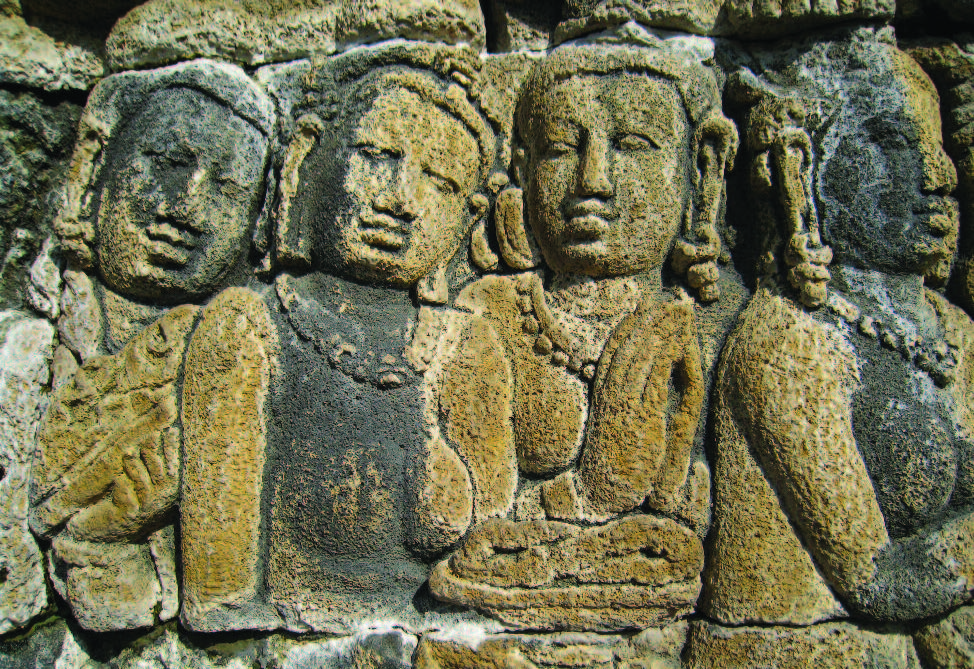
Anonymous Hindu
Long, long ago in a holy forest, there lived a young ascetic named Kaushika. Because he had renounced the worldly life, he spent his time studying the Vedas and Upanishads, practicing severe austerities, and doing penance.
After several years, his hard work and dedication brought Kaushika numerous spiritual powers, but he was largely unaware that they had been awakened. His practices continued uninterrupted. One day all this changed.
The day began like any other. Kaushika woke up well before sunrise, and after completing his daily ablutions and asanas, he proceeded to the banyan tree in front of his hut, where he regularly sat for meditation. Spreading a grass mat on the ground, he seated himself comfortably, and soon became absorbed in meditation.
Later that morning a flock of migrating cranes flew over the forest and an exhausted she-crane separated itself from the group to get some rest. She perched on the banyan tree under which the ascetic was meditating, and as fate would have it, a crow also landed on the same tree. Within no time the two birds started to skirmish, destroying the once peaceful atmosphere with their screeches.
Despite the intensifying disturbance amid falling twigs and dry leaves, Kaushika tried his best to ignore the commotion. He met with little success, however, and was unable to maintain his concentration. But as the young ascetic struggled to rein in his drifting mind, he felt something moist fall on his head. When he tried to brush it away, he realized that the damp thing was a dropping from one of the birds.
Kaushika was outraged. Angrily he rose from his meditation seat and shouted at the fighting birds, “You wretched creatures! How dare you defile me in this manner?” As he spoke, a spark of fire flared through the top of his head, and the birds collapsed onto the ground—burnt and reduced to ashes.
Shocked and remorseful, Kaushika went pale. But as is often the case, the voice of the conscience could not outlast the egoistic tendencies, and repentance soon gave way to newfound pride in his accomplishment.
“This is unbelievable!” an ecstatic Kaushika said to himself. “With a mere glance, I can destroy anyone by using my will power!”

As his ego reached its peak, the sun reached its zenith, and the ascetic abruptly realized that it was time for his midday meal. So he headed for the nearby village where he usually went for his daily alms, a village well known for its charity toward saints and ascetics, one where everyone served the needy and learned people reverentially.
When he reached his destination Kaushika approached a house, and holding out his begging bowl, he called aloud, “There is an ascetic at your doorstep, Mother. Please give him some food and the Lord will bless the family.”
From inside the house came the housewife’s response, “I will, my son. Please wait for a few moments.”
Kaushika waited, but there was no sign of the housewife. So he called out again. The lady of the house repeated her request, and asked him to be patient. But as the minutes elapsed and the wait became longer and longer, Kaushika’s temper grew steadily worse. “How stupid can this woman be?” he thought. “Making me stand in this heat? She will regret this!”
Just as he was about to pronounce a curse on the woman, a gentle but firm voice came from inside the house saying: “Son, don’t even think of doing that! I am not one of those unfortunate birds.”
Kaushika was shocked. Hastily, he took two steps backwards, and with folded hands he said, “Pray, tell me! You, who are a mere housewife, how could you read my mind? And how did you know what happened in the forest?”
A middle-aged woman stepped out of the house and placed some fruits, cooked rice, and vegetables in the begging bowl. After giving Kaushika a drink of water, she answered, “Yes, it is true that I am not a yogi and I do not have any spiritual powers. Neither do I have the time or the means to perform excruciating penances and go on distant pilgrimages. As you said, I am only a simple housewife.”
“In spite of that,” she continued, “I could read your thoughts and see how your powers had destroyed those innocent birds. I was able to do so because I worked hard trying to take care of my family without any selfish motives for my entire life. Know that by earnestly doing our duties, by working without worrying about the fruits of actions, and by being in constant divine remembrance, even the uneducated, ignorant people like me can attain that state of freedom and liberation which will eventually lead us to God.”
Kaushika listened to her spellbound, and then asked her hesitantly, “But Mother! Was it appropriate to make me wait so long? Shouldn’t you first serve the visitor at the doorstep and then take care of your household duties? Isn’t it said that the guest must always be served with due honor and respect?”
The lady replied, “Under normal circumstances, if everything were functioning smoothly in the family, I would have first attended to your needs. But when you knocked at the door I was attending to my sick husband, and that is the reason for this delay. My first duty is to take care of my family responsibilities. Only then comes the task of serving the rest of humanity.”
Deeply moved by her words, a humbled Kaushika bowed his head in shame, and said, “Revered Mother! You are highly evolved. Please endow me with knowledge and wisdom.”
The housewife smiled and said, “I see that you have recognized your folly. Go to the city of Mithila, which is ruled by King Janaka, and inquire of a certain Vyadha [butcher]. He is particularly virtuous and more highly evolved than I. Approach him with respect and he will teach you further.” Instructing him thus, she dismissed Kaushika, and walked back into the house to attend to her innumerable tasks.

Though skeptical about learning anything of spiritual value from a butcher, Kaushika was in a state of awe from what had just happened. So he departed immediately, and after several long days of travel reached Mithila.
After resting for the night, Kaushika woke up eagerly the next morning, made several inquiries and found the marketplace where the Vyadha worked, and was directed to a big fat man with long curly hair and a thick moustache. Ugly and disheveled, he was busy at the meat stall, cutting buffalo meat with a huge knife, weighing the pieces on the balance scale, and bargaining with customers.
Finally, seeing Kaushika standing at a distance, the butcher approached him and said, “Venerable ascetic! Surely, you are the one sent by that chaste lady! Please take a seat until I have concluded the day’s business. I will talk to you then.”
The ghastly sight and smells in the meat stall repulsed Kaushika. “What a disgusting job this is!” he muttered under his breath. “How can this butcher teach me about divinity and the ultimate truth?” But despite his aversion, he was intrigued—somehow the Vyadha knew about the housewife’s instructions and his own impending visit. How could that be possible? He was eager to know. So he reluctantly sat down and spent the rest of the day brooding over the meaning of these events.
Finally, when evening came and the day’s business was over, the butcher invited Kaushika to accompany him home. Impatient to hear what he had to say, Kaushika agreed, and the two men walked to the house together.
Upon reaching home, however, the butcher again asked the ascetic to wait. He spent the next hour attending to his feeble, old parents—washing them, feeding them, and massaging their legs and feet so they could sleep peacefully. And only then, after seeing that they did not need further assistance, did he return to Kaushika.
Looking at the young man’s face, the butcher said, “I can see that during the last few days you have learned a great deal about patience. Your anger is not reaching its flashing point so quickly and you are becoming much more appreciative of a householder’s responsibilities.”
Kaushika said, “What you say is true. But still I wonder: How can you be in a profession that is so repugnant and yet achieve what you seem to have achieved?”
The Vyadha replied, “To earn a livelihood and sustain the body, each one of us has a duty to perform, and this duty is sometimes determined by circumstances that are beyond our control. You must understand that there is no duty that is good and there is no duty that is bad. It is our attitude and how we approach that job that makes the difference.”
“To achieve illumination,” the butcher continued, “one does not have to become an ascetic or sannyasin. Neither does one have to study yoga and philosophy. Nor does one need to go on distant pilgrimages, shirking their responsibilities, and making their loved ones who are dependent upon them suffer unnecessarily.”
“Therefore, young man, discard this ego,” said the Vyadha, “and recognize that householders and commoners like me can also evolve spiritually by simply working with detachment and developing a prayerful attitude toward every job we need to perform. Know that as long as we fulfill our responsibilities to the best of our ability, without repulsion or attachment, as long as we perform our duties as a service to the Lord, in divine remembrance, all work becomes worship.”
Impressed by the magnitude of his words, Kaushika realized that both the virtuous housewife and the service-oriented Vyadha were more highly evolved than he. So he humbly asked the butcher to teach him about the nature of human conduct, morality, the soul, and God. The Vyadha was pleased to respond, and the ensuing conversation opened the ascetic’s mind and heart.
Ever since that time, spiritual teachers have repeated the Vyadha’s lesson to aspirants and told of the circumstances leading to it. Eventually their story came to be known as the Vyadha Gita, a shining testimonial to the power of karma yoga. And to this day, the Vyadha Gita, which was first mentioned in the Mahabharata, continues to inspire and educate people from all walks of life. ♦
From Parabola Volume 42, No. 4, “Families,” Winter 2017-2018. This issue is available to purchase here. If you have enjoyed this piece, consider subscribing.
